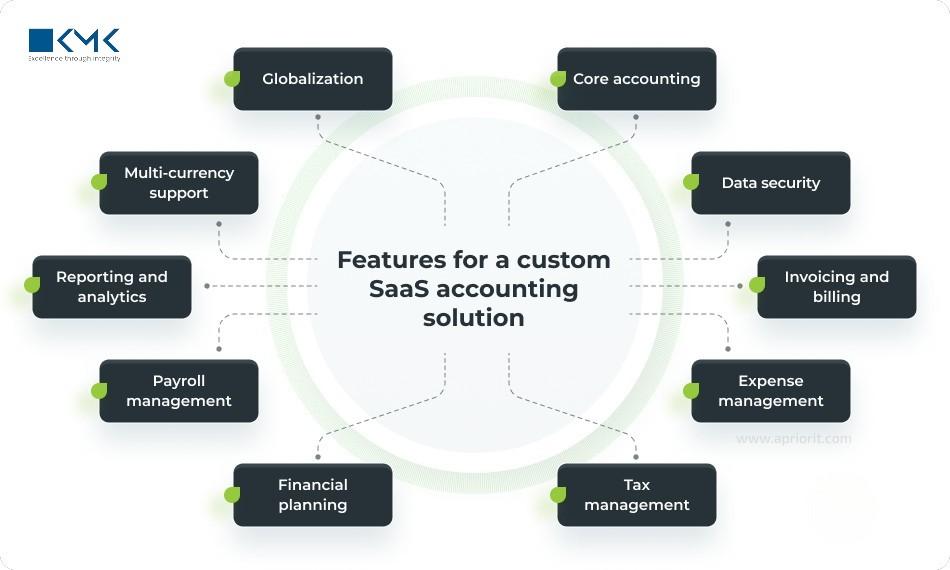SaaS Outsourced Accounting: Cost Efficiency and Scalability for US Businesses

Managing business finances in today’s fast-moving digital economy is more complex than ever. For US businesses, staying financially agile while keeping costs under control has become a strategic necessity. This is where SaaS outsourced accounting is gaining ground. By combining the flexibility of Software-as-a-Service (SaaS) platforms with the efficiency of outsourced expertise, companies can streamline operations, improve cash flow, and scale without the burden of traditional accounting overheads.
But how exactly does this model help businesses cut costs and scale faster? Let’s dive in.
What Is SaaS Outsourced Accounting?
At its core, SaaS outsourced accounting integrates two powerful concepts:
-
SaaS platforms that provide cloud-based accounting solutions accessible from anywhere.
-
Outsourced accounting services, where expert teams handle financial operations such as bookkeeping, payroll, accounts payable/receivable, and financial reporting.
Together, they create a hybrid solution where technology drives automation and outsourced specialists ensure accuracy, compliance, and strategic insights.
This combination is particularly relevant for US businesses in 2025, where financial agility and digital transformation are driving competitive advantage.
Why Businesses Are Turning to SaaS Outsourced Accounting
US companies, from startups to mid-sized firms, are asking the same questions: How do we reduce costs without sacrificing financial accuracy? How do we scale our accounting functions as we grow?
SaaS outsourced accounting provides clear answers:
-
Cost savings by eliminating the need for in-house accounting teams and expensive on-premise systems.
-
Scalability with cloud-based tools that adapt as your transaction volumes or reporting needs increase.
-
Expert support from accounting professionals who understand compliance, tax regulations, and industry-specific nuances.
This makes the model highly attractive for businesses that want to focus resources on growth rather than back-office functions.
Cost Efficiency: How SaaS Outsourced Accounting Saves Money
Cost efficiency is one of the strongest benefits of this approach. Here’s how it works in practice:
-
No costly infrastructure – Traditional accounting systems require hardware, software licenses, and ongoing IT support. SaaS solutions run on the cloud with predictable monthly fees.
-
Reduced staffing costs – Outsourcing eliminates the need for hiring, training, and retaining a full-time finance team. Instead, you pay only for the services you use.
-
Fewer errors, lower risk – Automation in SaaS platforms reduces human errors, while expert oversight minimizes compliance risks that could lead to penalties.
-
On-demand scalability – Businesses can adjust their accounting services as they grow, avoiding unnecessary fixed costs.
Imagine a US startup trying to manage payroll, tax filing, and vendor payments in-house. The administrative burden alone could drain resources. With SaaS outsourced accounting, these tasks are handled seamlessly, often at a fraction of the cost.
Scalability: Growing Without Financial Bottlenecks
As businesses expand, financial operations become more complex. Manual spreadsheets and small teams can’t keep up with growing demands. This is where SaaS outsourced accounting shines:
-
Flexible service tiers – Whether you’re processing 100 invoices a month or 10,000, outsourced teams and SaaS platforms scale effortlessly.
-
Real-time insights – Cloud-based dashboards provide live data, helping leaders make faster, smarter decisions.
-
Multi-entity and multi-currency support – Perfect for US firms expanding globally or managing multiple subsidiaries.
-
Future-ready infrastructure – SaaS solutions continually update with new features, ensuring your accounting remains cutting-edge without extra investment.
For example, a mid-sized eCommerce firm scaling nationwide can rely on SaaS outsourced accounting to handle spikes in sales transactions during holiday seasons without missing a beat.
Key Benefits for US Businesses
Here’s a breakdown of why more US companies are adopting SaaS outsourced accounting in 2025:
-
Cost predictability – Clear subscription pricing makes budgeting easier.
-
Access to expertise – Gain financial specialists without hiring full-time staff.
-
Enhanced compliance – Stay on top of US tax laws, GAAP, and regulatory requirements.
-
Increased productivity – Internal teams can focus on strategy, innovation, and customer growth.
-
Stronger cash flow management – Automation and outsourced oversight help optimize receivables and payables.
SaaS Outsourced Accounting in Action: Real-World Scenarios
-
Startups – Early-stage SaaS startups often lack the resources for an internal finance team. By outsourcing, they access professional-grade accounting while keeping costs lean.
-
SMBs (Small and Mid-sized Businesses) – Many US SMBs need scalable accounting solutions that grow with them. SaaS outsourcing ensures they don’t outgrow their systems.
-
Enterprises – Even larger companies use this model to streamline processes, cut overhead, and focus their in-house teams on strategic financial planning.
Addressing Common Questions
Is SaaS outsourced accounting secure?
Yes. Reputable SaaS providers use advanced encryption, compliance certifications (like SOC 2), and secure cloud infrastructure to protect financial data.
Will outsourcing mean losing control over finances?
Not at all. Businesses retain full visibility through dashboards, real-time reports, and ongoing communication with outsourced teams.
Is this model suitable for highly regulated industries?
Absolutely. In fact, outsourced providers often specialize in compliance-heavy industries like healthcare, finance, or legal, ensuring peace of mind.
Why Now Is the Time to Adopt
The US business landscape in 2025 is digital-first, competitive, and fast-moving. Traditional accounting systems are too rigid and expensive to keep up. SaaS outsourced accounting provides the perfect balance of affordability, scalability, and expert support.
By adopting this model, companies not only reduce operational costs but also position themselves for sustainable growth. It’s no longer just an option—it’s becoming the new standard in financial management.
Final Thoughts
For US businesses seeking a smarter, leaner, and more scalable approach to managing finances, SaaS outsourced accounting is a game-changer. It combines the efficiency of cloud platforms with the reliability of professional expertise, giving companies the tools they need to thrive in 2025 and beyond. Whether you’re a startup aiming to stretch your budget, a mid-sized firm preparing for expansion, or an established company optimizing efficiency, the message is clear: SaaS outsourced accounting delivers cost efficiency and scalability like no other model.




